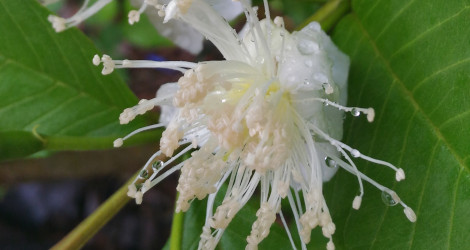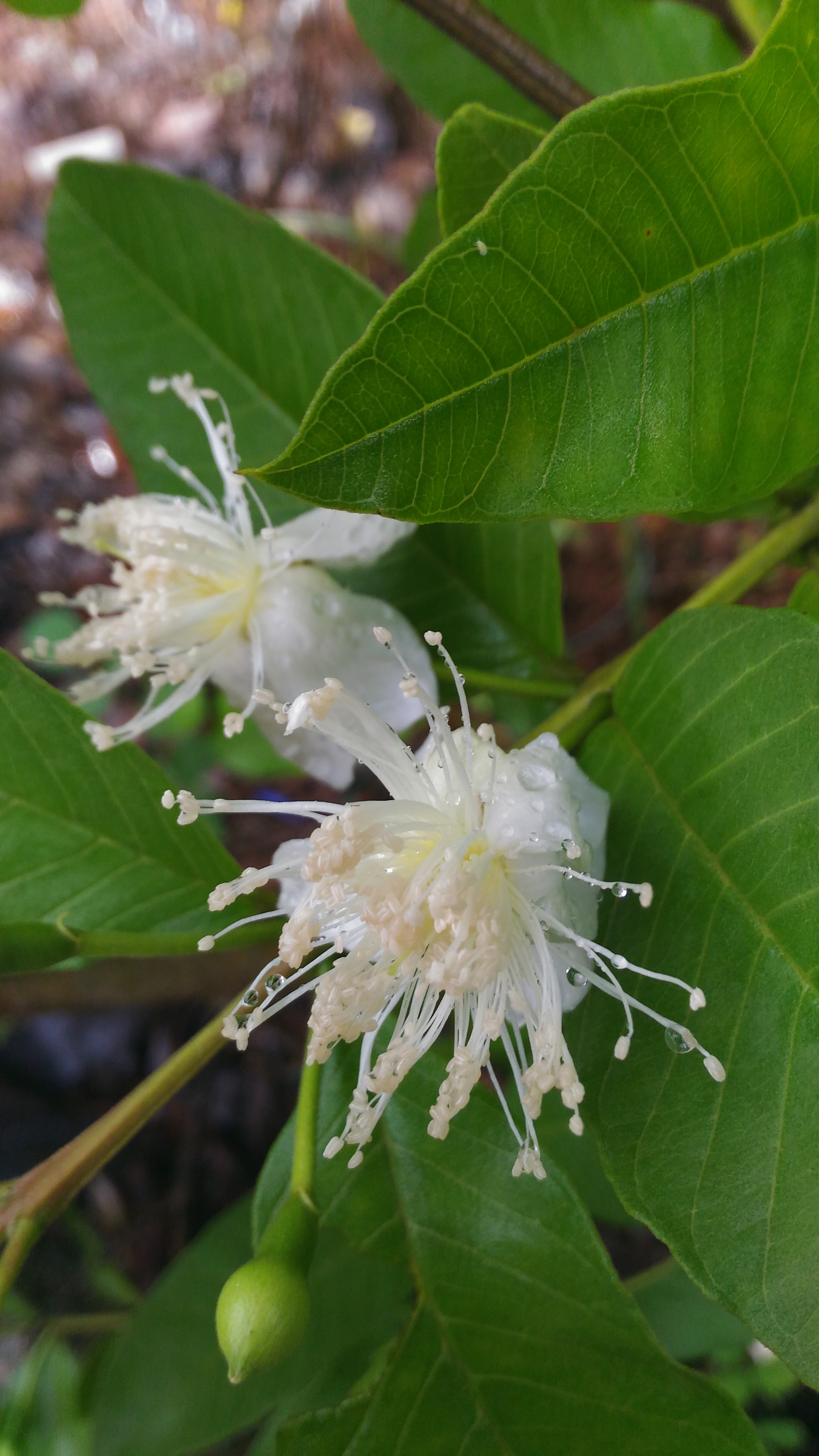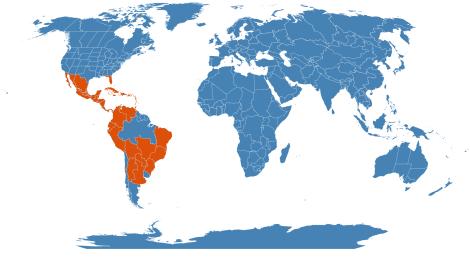Accession Data
Psidium guajava
Common Name: Guava
Family: Myrtaceae
Country of Origin: Trop. & Subtrop. America
Description: Shrub or small tree, to 30 feet, bark scaly, greenish-brown, branchlets 4-angled; leaves ovate to oblong-elliptic, to 6 inches long, pubescent beneath, veins prominent; flowers white, solitary or few together on slender peduncles; fruit ovoid to pear-shaped, 1-4 inches long, with yellow or dark pink flesh.
[Thai: farang, ma kuai]
Uses: Edible: The fruits are used in many ways as a fresh fruit, or the juice may be used for punch or ices. The greatest commercial use of Guava fruit is for jelly. Fruit varies in size, shape, color and flavor, and has a musky, penetrating odor. somewhat insipid when raw, it may be canned, preserved, spiced, and made into jam, relish or chutney. the juice is used for punch.
Medicinal:Preliminary medical research in extracts from the leaves and bark are implicated in therapeutic mechanisms against cancer, bacterial infections, inflammation and pain. For instance, the essential oils from the leaves have shown strong anti-cancer activity. The numerous tannins, polyphenolic compounds, flavonoids, ellagic acid, triterpenoids, guiajaverin, quercetin, and other chemical compounds present in the plant are speculated to account for the observed anti-inflammatory and analgesic effects of the plant's leaf extract. Quercetin is thought to contribute to the anti-diarrhea effect of guava.
Obtained research results suggest that the spasmolytic activity of the Psidium guajava leaf remedy is mainly due to the aglycone quercetin, present in the leaf and in the extract mainly in the form of five flavonols. Quercetin that has demonstrated anti-viral properties against a wide range of viral infections, including the flu. In a current cell study, it was shown to reduce viral replication of the dengue fever virus by 67%. Research suggests that Guava has cardioprotective effects against myocardial ischemia-reperfusion injury in isolated rat hearts, primarily through their radical-scavenging actions.
Guava leaves may treat Dengue fever. The fever is transmitted by the Aedes aegypti mosquito and caused by a virus. Good care is required to recover but dengue fever can be cured with natural ingredients; important is to anticipate at the occurrence of bleeding. The leaves increase the platelets to avoided bleeding; a decoction can raise the platelet count considerably within a period of hours.
Medicinal Info From: Tropilab, http://www.tropilab.com/guavatea.html
Accession Data
USDA Zone: 9a-11
Accession #: 199200140
Accession Date: 1991-12-18 00:00:00
Bloom Status: 🌸 Flowering
Location: 1316
Quantity: 1
Source: J. Caira
Culture:
Classification
Division: Magnoliophyta
Class: Magnoliopsida
Subclass: rosids
Order: Myrtales
Family: Myrtaceae
SubFamily: Myrtoideae
Tribe: Myrteae
Flowering Data:
This accession has been observed in bloom on:| Year | Jan | Feb | Mar | Apr | May | Jun | Jul | Aug | Sep | Oct | Nov | Dec | ||||||||||||||||||||||||||||||||||||||||
|---|---|---|---|---|---|---|---|---|---|---|---|---|---|---|---|---|---|---|---|---|---|---|---|---|---|---|---|---|---|---|---|---|---|---|---|---|---|---|---|---|---|---|---|---|---|---|---|---|---|---|---|---|
| 2026 | ||||||||||||||||||||||||||||||||||||||||||||||||||||
| 2025 | ||||||||||||||||||||||||||||||||||||||||||||||||||||
| 2024 | ||||||||||||||||||||||||||||||||||||||||||||||||||||
| 2023 | ||||||||||||||||||||||||||||||||||||||||||||||||||||
| 2022 | ||||||||||||||||||||||||||||||||||||||||||||||||||||
| 2021 | ||||||||||||||||||||||||||||||||||||||||||||||||||||
| 2020 | ||||||||||||||||||||||||||||||||||||||||||||||||||||
| 2019 | ||||||||||||||||||||||||||||||||||||||||||||||||||||
| 2018 | ||||||||||||||||||||||||||||||||||||||||||||||||||||
| 2017 | ||||||||||||||||||||||||||||||||||||||||||||||||||||
| 2016 | ||||||||||||||||||||||||||||||||||||||||||||||||||||
| 2015 | ||||||||||||||||||||||||||||||||||||||||||||||||||||
| 2014 | ||||||||||||||||||||||||||||||||||||||||||||||||||||
| 2013 | ||||||||||||||||||||||||||||||||||||||||||||||||||||
| 2012 | ||||||||||||||||||||||||||||||||||||||||||||||||||||
| 2011 | ||||||||||||||||||||||||||||||||||||||||||||||||||||
| 2010 | ||||||||||||||||||||||||||||||||||||||||||||||||||||
| 2009 | ||||||||||||||||||||||||||||||||||||||||||||||||||||
| 2008 | ||||||||||||||||||||||||||||||||||||||||||||||||||||
| 2007 | ||||||||||||||||||||||||||||||||||||||||||||||||||||
References
- The Plant List (2013). Version 1.1. Last accessed on Tuesday, September 12, 2017.
- WCSP (2017). World Checklist of Selected Plant Families. Facilitated by the Royal Botanic Gardens, Kew. Last accessed on Tuesday, September 12, 2017.
- Image #00 (cropped) & #01 (original) by Vijayanrajapuram [CC BY-SA 4.0], from Wikimedia Commons. Last accessed Wednesday, 12 December, 2018.
Images


